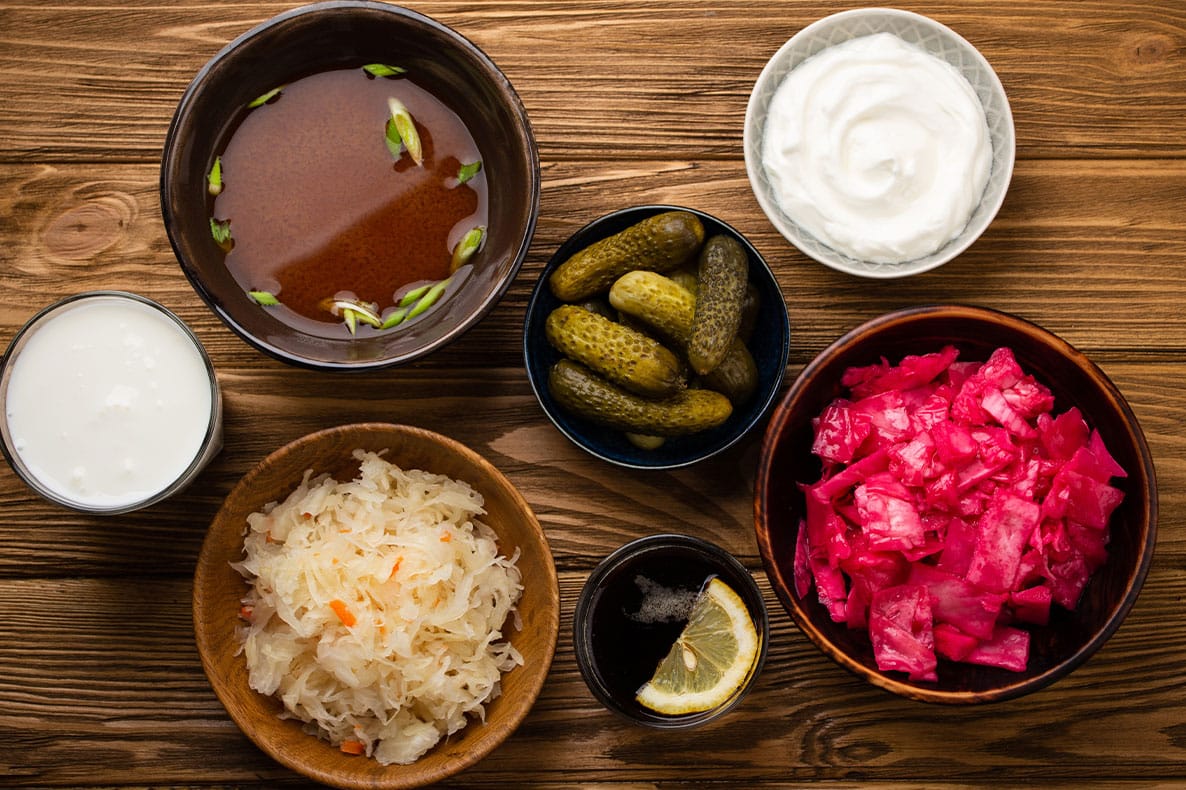We do NOT answer medical questions online or via text. We do NOT sell individual peptides. Our clinical peptides are available only through our optimization and longevity programs.
Your gut is home to trillions of microbes that decide how well you digest food, absorb nutrients, and fight infections. Probiotics are the “good” bacteria in that mix. You can add more of them through foods like yogurt and kimchi or by taking a supplement.
Prebiotics are the fibers that feed those microbes so they can grow and do their job.
If you load up on probiotics without giving them fuel, they won’t thrive. If you eat plenty of fiber without enough probiotics, the system still falls short.
When both are present, the gut microbiome runs at full strength — balanced, resilient, and able to keep the rest of your body steady.
This guide breaks down what probiotics and prebiotics are, how they work, when you might need them, and why your gut runs best when both are in play.
Probiotics vs Prebiotics: At a Glance
| Feature | Probiotics | Prebiotics |
|---|---|---|
| What they are | Live microorganisms (bacteria or yeast) that support gut balance | Fibers that feed beneficial microbes already in your gut |
| What they do | Add new “good” bacteria to the gut | Fuel the growth and activity of those bacteria |
| Food sources | Yogurt with live cultures, kefir, kimchi, sauerkraut, miso, kombucha | Garlic, onions, leeks, asparagus, oats, legumes, bananas, cooked-and-cooled potatoes |
| Supplement forms | Capsules, powders, liquids with specific strains and CFUs | Fiber powders, inulin, FOS, GOS, resistant starch |
| When most useful | After antibiotics, diarrhea, IBS, low microbial diversity | Constipation, sluggish digestion, low-fiber diets, metabolic support |

What Are Probiotics and How Do They Work?
Probiotics are live microorganisms — mostly bacteria and some yeast — that naturally live in your gut and can also be added through foods or supplements. The most common groups are Lactobacillus and Bifidobacterium, each containing many different strains with slightly different effects.
They work by competing with harmful microbes, producing protective compounds like short-chain fatty acids, and strengthening the gut lining so it can absorb nutrients and keep pathogens out.
You can find probiotics in everyday foods that have been fermented and left with live cultures:
- yogurt with live cultures
- kefir
- kimchi and sauerkraut
- miso
- kombucha
Can’t handle sour foods? Supplements are usually packaged with strain information and CFU counts on the label:
- capsules with single or multi-strain blends
- powders mixed into drinks or food
- liquid formulations, often refrigerated
Adding probiotics consistently can make a difference in digestion and immunity:
- steadier digestion and less bloating
- reduced diarrhea, especially after antibiotics
- improved nutrient absorption
- stronger gut barrier and immune defenses
Probiotic supplements are hard to pin down. Even dietitians struggle to know which strains to choose and how to track results. Most of the research comes from small human trials or animal studies, which means the evidence base is still limited.
What Are Prebiotics and How Do They Work?
Prebiotics are certain types of dietary fiber that your body can’t digest but your gut microbes can. They act as fuel for the bacteria already living in your colon, giving them the energy to grow and produce compounds that support your health. The most studied examples include inulin, fructo-oligosaccharides (FOS), galacto-oligosaccharides (GOS), and resistant starch.
You can get prebiotics naturally from a wide range of plant foods that deliver fermentable fiber:
- garlic
- onions
- asparagus
- oats
- legumes and beans
- bananas (especially slightly green ones)
Once prebiotics reach the large intestine, gut microbes ferment them and produce short-chain fatty acids (SCFAs) such as acetate, propionate, and butyrate. These SCFAs fuel the cells that line the colon, lower inflammation, and help keep the gut barrier strong.
Adding prebiotics can trigger changes you’ll notice. Gas, bloating, or cramping are common in the first days because microbes are adapting. Starting with small amounts and increasing gradually makes those side effects easier to handle.
Prebiotic supplements are also available, but the research is still limited. Most studies are small and don’t always translate into consistent results in real life.

Do You Need to Take Prebiotics and Probiotics Together?
You can’t fertilize an empty garden.
Probiotics bring the living microbes, and prebiotics give them something to feed on.
Without that pairing, the gut ecosystem stays weak. Together, they create what’s called a synbiotic — a balance of bacteria and fiber that gives the microbiome staying power.
When both are present, the microbes multiply, produce more short-chain fatty acids, and keep the gut lining strong.
The effect shows up in everyday ways: digestion feels steadier, nutrients get absorbed more efficiently,
and the immune system trains itself against daily stressors.
What Are the Signs You Need Prebiotics, Probiotics, or Both?
Your gut will usually tell you when it needs help. The signals show up in patterns you can recognize:
- Digestion clues: irregular stool, frequent bloating, excess gas, or constipation that doesn’t ease with small changes in diet
- Immune signs: catching colds often, taking longer to recover, or showing higher markers of inflammation
- Metabolic signs: cravings for sugar, daily fatigue, or blood sugar swings that leave energy unstable
- When both are useful: if your diet runs low in fiber, if antibiotics are common, or if stress takes a steady toll on digestion and immunity
These are signs that the system is out of balance — and that balance usually comes back when both probiotics and prebiotics are in play.
Where Do You Get Probiotics and Prebiotics in Daily Life?
Food should always come first. Probiotics and prebiotics occur naturally in everyday meals if you know where to look. Supplements can help, but they work best when they’re building on a foundation of diet.
Probiotic foods
- yogurt with live cultures (look for “live and active cultures” on the label)
- kefir, both dairy and nondairy
- kimchi, sauerkraut, and other fermented vegetables (unpasteurized)
- miso and tempeh, staples in many Asian cuisines
- kombucha, a fermented tea that delivers live microbes
- certain aged cheeses, like gouda or cheddar, when they contain active cultures
Probiotic supplements
- capsules or tablets containing one or more strains, listed by name and CFU count
- powders that can be mixed into water or smoothies
- liquid formulations, usually refrigerated to preserve viability
Prebiotic foods
- garlic, onions, leeks, and shallots, rich in inulin
- asparagus, Jerusalem artichokes, and dandelion greens
- oats, barley, and other whole grains
- legumes, beans, and peas
- bananas, especially when slightly green
- cooked-and-cooled potatoes or rice, which form resistant starch
- apples and berries, which contain pectin and other fermentable fibers
Prebiotic supplements
- inulin and fructo-oligosaccharides (FOS), often in powder form
- galacto-oligosaccharides (GOS), common in specialized blends
- resistant starch powders that can be stirred into food or drink
- newer formulas combining multiple fibers to target different microbes
You can pair foods naturally — kefir with oats at breakfast, miso soup with vegetables at lunch, or sauerkraut alongside a protein-rich dinner. You’ll feed your microbes from both directions: live cultures moving in, and fermentable fibers sustaining them.
Supplements are worth considering when your diet is limited, when you’ve just finished antibiotics, or when a clinician recommends them as part of a broader gut health plan.

When Should You Be Careful With Probiotics or Prebiotics?
If your immune system is weak or your gut is already inflamed, adding bacteria or fiber can backfire.
Avoid them if you’re dealing with:
- a compromised immune system that leaves you open to infection
- an inflammatory bowel disease (IBD) flare, when the gut lining can’t handle more stress
- small intestinal bacterial overgrowth (SIBO), where extra microbes or fiber feed the wrong population
- severe bloating or abdominal pain that gets worse with fermentable foods
If you’re otherwise healthy, start small and pay attention:
- Increase slowly over one to two weeks.
- Add only one new product at a time.
- Drink more water if you raise fiber intake.
- Reassess in two to four weeks and stop if symptoms don’t improve.
Balance in the Gut Builds Resilience
Probiotics add the microbes. Prebiotics feed them. Together they keep the gut ecosystem balanced, which steadies digestion, supports nutrient absorption, and strengthens defenses. When the system runs smoothly, the rest of the body feels the difference.
If your plate is already filled with whole foods, fruits, vegetables, and grains, you’re likely already getting a steady supply of prebiotics. In that case, the next step is adding more probiotic foods — yogurt with live cultures, kefir, kimchi, sauerkraut, miso, or kombucha — to build up the microbial community.
If your diet leans light on fiber, then both prebiotics and probiotics need attention to get the system back in balance.
Probiotics vs. prebiotics? Both. Always both.
Yunique Medical: Strength Built Into the System
Health lasts when the whole system works in sync. That means steady hormones, nutrients in balance, energy that recovers quickly, and defenses that hold up under stress.
Yunique Medical builds solutions that optimize how your body functions day to day.
The goal is not to chase symptoms — it’s to design a foundation that keeps you performing, recovering, and aging with more control over the process.
Our Services
We offer a wide range of services to support your wellness journey, including:
- Hormone Optimization
- Infusion Therapy
- Weight Loss Programs
- Cellular & Functional Medicine
- Precision Longevity
- HeartFit Program
- Sexual Enhancement
- Peptide Therapy
- HOCATT Biohacking
Our Locations
You can find us here:
- Port Orange, FL
- Lady Lake, FL (formerly Fruitland Park Office)
- Ocala, FL
Schedule a consultation to see how we can help you build that foundation.



